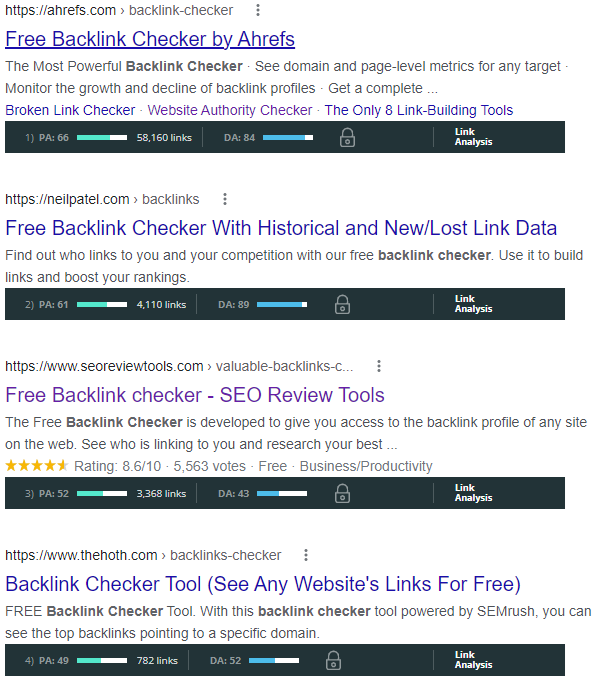A lot of people think that Domain Authority (DA) is a Google ranking factor, but it is not. Your DA score will predict how likely you are to rank on search engines. This blog will also explain what Domain Authority is (and how it’s calculated), as well as ways you can improve your website’s DA.
What is Domain Authority?
Domain Authority is a machine algorithm developed by Moz that predicts how likely a website will rank on Search engine results pages (SERPs). While Moz was the original DA score checker, many more companies have brought out their own (or use Moz). The score will be given on a number between 1-100 with higher scores having a greater chance of performing well on SERPs. It’s worth remembering that Domain Authority is not a Google ranking factor and it does not directly affect where your website ranks in search results. However, Domain Authority can help you gauge how your website might fair against competing websites when battling for certain search terms/keywords.
A sites’ Domain Authority is based on multiple factors. Some of them are listed below:
- Quality of the inbound links (backlinks) – other sites linking to your site.
- Spam score – determines if the inbound links are spam sites.
- Age of domain – How old is the website?
- Site structure – Is your site easy to navigate and user-friendly?
- Quality of content on your site – You need to ensure you have excellent quality helpful content on your site that is relatable and readable.
- Website speed – Does your site load swiftly?
You can use a free DA checker to assess your and your competitor’s websites. One way to assess your DA score is to look at your competitors, you want to score higher than your direct competitors.
Let’s assume your website has a “backlink checker” service. In the example below, the search term entered was “backlink checker.” What you will notice is those with the higher DA are placed higher than the 2 who have lower DA. You can even see that Ahrefs has the highest number of linking domains at 58,160. It is feasible to assume that if you are a newer business, you will not be competing with industry-leading businesses (in this case, Ahrefs or Neil Patel), however, further down the page, you have businesses that have a DA of around 50, that is where you want to be.

Image credit – Google
One important thing to note is that Domain Authority is different from page authority. Page authority gives you the ranking of a particular page, whereas Domain Authority assesses the whole domain/website.
Why is Domain Authority important?
Your Domain Authority is an indicator of how you rank on search engines therefore it is a vital tool for SEO. You want to be able to rank well, and this is where Domain Authority can help you establish what you need to work on.
Domain Authority is a valuable tool as it helps you factor in where you could rank on SERPs. In addition to this, when you use sites that assess your DA, many of them will provide you with more information to help you improve your site (and overall DA ranking). We particularly like using Moz or SEMrush as they give you additional metrics which you can use to improve your website.
What is a good Domain Authority?
Let’s consider for a second that a website with an already high DA score gets a huge amount of quality backlinks, this would have a knock-on effect for the smaller sites in the same category, as they would receive a lower DA score.
As we have previously said, many things can impact a DA score, however, there are ranges that you should strive to achieve. Very few websites will get between 95-100, those that do are generally the tech giants such as Google, Apple, and Microsoft. New websites will likely have an incredibly low DA score, this could be 20 or below (although that will increase with age and good quality content).
While many sites will offer a scale highlighting a good/bad DA scores, the truth is there is no specific number that you need to achieve. It depends on your industry and other websites that fall into the same genre as you. As a rule, you want to have a higher DA than your direct and indirect competitors. With all that being said, we have provided you with some guidelines although as we have said, there could be differences within the industry you fit in:
0-20 Needs improvement
20-30 – Ok
30-50 – Good
50-60 – Very good
60+ – Excellent
With everything being said, a good DA score is one that is higher than your competitors.
How to increase Domain Authority
Consider this: why do you want to increase your DA? Increasing your DA for the sake of increasing your DA can be a vanity metric. Remember that Google does not use DA as a ranking factor. If you want to improve it so you can have a fully optimised website, or if you are considering selling the domain then that makes sense. There are many things you can do on your website to help improve your DA score.
- Optimise your on-page SEO – Important things to consider include your header hierarchy, as well as meta titles and descriptions, ALT text, and naming file conventions to name but a few. This guide will give you a more comprehensive guide to on-page SEO.
- Create consistent content – You want to create content that is useful to the user. Think back to Google’s helpful content update; they wanted websites to create relevant helpful content for the end user. Your content should be tailored to your website. For example, LOCALiQ as a B2B marketing agency publishes lots of blogs that relate to its services. There is no point in us writing about the best sandwich you can buy as that is not a service we offer.
- Off-page SEO – In line with the next point, your off-page SEO tactics include link-building and digital PR. Consider things such as mentions on other websites, and mentions in the press (with links to your website) this can be anything from sales to CSR activities.
- Work on a backlink strategy – You want to increase your authority and one of the ways to do that is to gain backlinks. For example, if you have guest blogged on a different website or appeared in a podcast, message those people and get them to link to your page. Hopefully, the links you get will be from higher authority websites.
- Backlink analysis – You need to look at your backlinks and ensure they are from high-quality sources. You should also ensure that you have no spammy links, these are links that link to you that are of low quality and spammy. You can ask for these links to be “no follow” if you would rather your site not be associated with these links.
- Do a site audit – A thorough site audit can help you see if you have any bad or spammy links. These can do more harm than good for your website. Use Google Search Console to ignore any of these bad links.
- Work on internal links – Internal links are effective as they keep your user on your page longer, and a strong time on page is great for SEO. You will notice quite a lot of our blogs link to other blogs on a related topic. This is beneficial for us as well as the reader, with the reader getting more information that is relevant.
- Get listed in directories – There are plenty of online directories and getting your business listed here can help you to improve your DA as well as boost your local SEO efforts (and maybe gain more customers.) Our blog on local listings can help you find some great free and paid-for directories.
Like many SEO practices, you will not see immediate results. Just keep following the best practice guidelines listed above and you will eventually see your Domain Authority increase, and may get more high quality leads to your website.
If you found this blog interesting, then please consider sharing it with your friends and colleagues. Additionally, you can sign up for our monthly newsletter today which provides great articles, actionable tips and tricks as well as breaking industry news.






